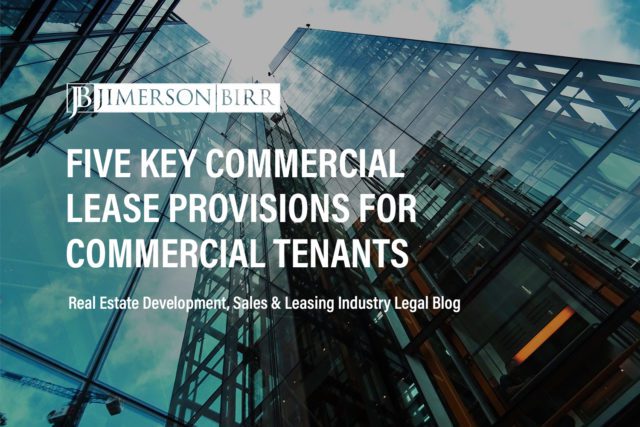What are commercial leases?
Commercial leases are legally binding agreements between landlords and tenants that outline the terms and conditions for the rental of commercial properties, such as office spaces, retail stores, and industrial buildings. In Florida, commercial leases differ from residential leases, including the negotiation process, tenant protections, and legal remedies available to both parties.
An example of a commercial lease under Florida law is a triple net lease, where the tenant is responsible for property taxes, insurance, maintenance costs, and the base rent. This type of lease is common in retail and industrial properties. It allows landlords to shift some of the financial burdens to the tenant while providing the tenant with greater control over the property’s expenses.
Need a commercial leasing advocate? Schedule your consultation today with a top commercial landlord/tenant leasing attorney.
In Florida, which laws and regulations apply to commercial leases?
The Florida Statutes, Chapter 83, Part I governs residential leases, but commercial leases are not addressed explicitly within this statute. Instead, commercial lease agreements in Florida are subject to contract law, the general principles of landlord-tenant law, and federal regulations, such as the Americans with Disabilities Act (ADA) and environmental regulations.
In particular, Florida contract law plays a significant role in commercial lease agreements, as these contracts must comply with general principles of contract formation and enforcement. For instance, the Florida Statutes, Chapter 672 (Uniform Commercial Code), and Chapter 725 (Fraudulent Transfers) are examples of statutes that may impact commercial leases.
Furthermore, common law principles help fill the gaps where statutes do not address specific commercial lease issues. For example, Florida courts have established the implied covenant of quiet enjoyment, which ensures tenants have the right to use and enjoy the leased premises without undue interference from the landlord.
Additionally, federal regulations play a role in commercial leasing. For instance, the ADA requires commercial properties to provide accessibility to individuals with disabilities, and environmental regulations impose specific requirements for properties that handle hazardous materials.
How do commercial leases commonly lead to litigation between commercial landlords and tenants?
The following issues commonly lead to litigation:
- Rent disputes: Disagreements over the amount, calculation, or payment of rent can lead to litigation. These disputes may arise from lease agreement ambiguities or differing rent escalation clause interpretations.
- Maintenance and repair responsibilities: Conflicts often occur when there is a lack of clarity regarding the division of duties for property maintenance, repairs, or improvements between the landlord and tenant.
- Common area charges: In multi-tenant properties, disputes may arise over allocating common area maintenance (CAM) charges and other shared expenses.
- Use and exclusivity clauses: Disputes may stem from disagreements over the tenant’s permitted use of the leased space or conflicts with exclusivity provisions that prevent competing businesses from leasing nearby spaces.
- Lease termination and default: Conflicts may occur over lease termination, whether due to the tenant’s default (monetary or non-monetary) or the landlord’s actions, such as wrongful eviction or lockout.
When a set of facts is appropriate for legal intervention, there are many paths a claimant may take. We are value-based attorneys at Jimerson Birr, which means we look at each action with our clients from the point of view of costs and benefits while reducing liability. Then, based on our client’s objectives, we chart a path to seek appropriate remedies.
To determine whether your unique situation may necessitate litigation or another form of specialized advocacy, please contact our office to set up your initial consultation.
How should counsel for commercial landlords draft, review, and negotiate a lease that mitigates litigation risks?
Counsel should consider the following to protect their clients:
- Clearly define rent terms: Ensure that the lease agreement unambiguously defines rent amounts, payment schedules, and escalation clauses to minimize the risk of disputes.
- Specify maintenance and repair obligations: Clearly outline the landlord and tenant’s responsibilities regarding property maintenance, repairs, and improvements to avoid potential conflicts.
- Detail common area charges: Specify the allocation of CAM charges and other shared expenses among tenants and provide a transparent calculation method.
- Clarify use and exclusivity clauses: Draft well-defined provisions regarding the tenant’s permitted use of the leased space and any exclusivity clauses to prevent misunderstandings and potential disputes.
- Outline lease termination and default procedures: Clearly state the conditions that constitute a default, the required notices, and the remedies available to both parties. Additionally, specify the procedures for lease termination, including any applicable notice periods and penalties.
- Include dispute resolution mechanisms: Incorporate alternative dispute resolution (ADR) methods, such as mediation or arbitration, into the lease agreement to provide a more efficient and cost-effective way to resolve potential disputes before litigation.
Please contact our office to set up your initial consultation to see what forms of intellectual property protection may be available for your unique situation.
Frequently Asked Questions
- What are the different types of commercial leases?
There are many different types of commercial leases, each with its own set of terms and conditions. However, some of the most common types of commercial leases include the following:
- Gross leases: In a gross lease, the landlord pays for all of the operating expenses of the property, such as taxes, insurance, and utilities.
- Net leases: In a net lease, the tenant pays for a portion of the property’s operating expenses in addition to the rent.
- Modified gross leases: A modified gross lease is a hybrid of gross and net leases. In a modified gross lease, the landlord pays for some operating expenses, but the tenant pays for others.
- What are the key terms of a commercial lease?
The key terms of a commercial lease will vary depending on the type of lease, but some of the most common terms include the following:
- Term: The lease term is the length of time that the tenant will have the right to occupy the property.
- Rent: The rent is the amount the tenant will pay the landlord each month.
- Security deposit: A security deposit is a sum that the tenant pays the landlord when they sign the lease. The landlord holds the security deposit in case the tenant damages the property or fails to pay rent.
- Use clause: The use clause specifies the types of businesses allowed to operate on the property.
- Assignment and subletting: An assignment is when the tenant transfers their rights under the lease to another party. A subletting is when the tenant allows another party to use the property for a period of time.
- Default: A default is a breach of the lease by either the landlord or the tenant. If either party defaults, the other party may have the right to terminate the lease.
- What should tenants keep in mind after signing a commercial lease?
After you have signed a commercial lease, there are a few things that you should keep in mind:
- Make sure you pay your rent on time: Rent is typically due on the first day of each month. You may be subject to late fees or eviction if you do not pay your rent on time.
- Take good care of the property: You are responsible for keeping the property in good condition, including making repairs and maintaining the property.
- Notify the landlord of any changes: If you change your business, such as changing the hours of operation or adding new employees, you should notify the landlord.
- Comply with all of the terms of the lease: It is essential to comply with all of the terms. If you breach the lease, the landlord may have the right to terminate the lease or take other legal action against you.
Have more questions about how commercial leasing could impact your business?
Crucially, this overview of commercial leases does not begin to cover all the laws implicated by this issue or the factors that may compel the application of such laws. Every case is unique, and the laws can produce different outcomes depending on the individual circumstances.
Jimerson Birr attorneys guide our clients to help make informed decisions while ensuring their rights are respected and protected. Our lawyers are highly trained and experienced in the nuances of the law, so they can accurately interpret statutes and case law and holistically prepare individuals or companies for their legal endeavors. Through this intense personal investment and advocacy, our lawyers will help resolve the issue’s complicated legal problems efficiently and effectively.
Having a Jimerson Birr attorney on your side means securing a team of seasoned, multi-dimensional, cross-functional legal professionals. Whether it is a transaction, an operational issue, a regulatory challenge, or a contested legal predicament that may require court intervention, we remain tireless advocates at every step. Being a value-added law firm means putting the client at the forefront of everything we do. We use our experience to help our clients navigate even the most complex problems and come out the other side triumphant.
If you want to understand your case, the merits of your claim or defense, potential monetary awards, or the amount of exposure you face, you should speak with a qualified Jimerson Birr lawyer. Our experienced team of attorneys is here to help. Call Jimerson Birr at (904) 389-0050 or use the contact form to schedule a consultation.

We live by our 7 Superior Service Commitments
- Conferring Client-Defined Value
- Efficient and Cost-Effective
- Accessibility
- Delivering an Experience While Delivering Results
- Meaningful and Enduring Partnership
- Exceptional Communication Based Upon Listening
- Accountability to Goals











